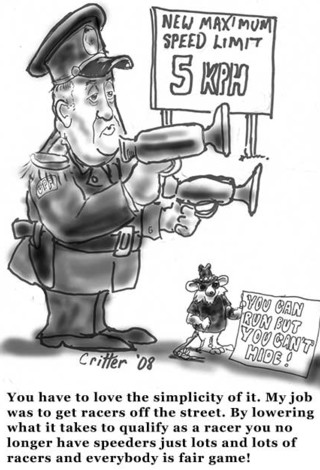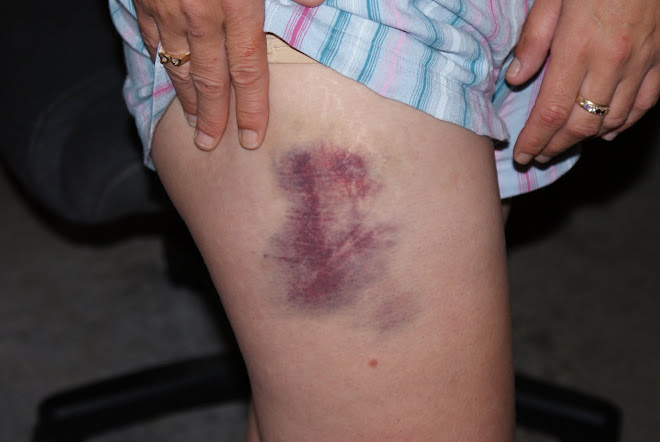
JIM KENZIE
Special to the Star
Jan 09, 2009
Ontario Provincial Police Commissioner Julian Fantino must be feeling pretty smug.
After all, since the street racing law went into effect a year ago, more than 7,000 drivers in Ontario have had their licences suspended and their vehicles impounded – and fewer people have been killed on the province's highways.
Of course, Fantino would have his salary-paying taxpayers believe he is doing a wonderful job, based on the questionable conclusions he has reached using a statistical sleight of hand.
One of Fantino's favourite numbers is the 209 Ontario traffic deaths in the first eight months of 2008 versus the 309 deaths in the same months in 2007, before the stunt driving/street racer law was in full effect.
This is flawed logic. For starters, you only have a two-point trend.
To put it into context, you have to know that traffic deaths have been dropping steadily and dramatically in recent years. In 1981, 5,383 people died nationwide on our roads. By 2006, that was down to 2,889, almost half the number, which is spectacular and due almost entirely to stronger cars and stiffer seat belt legislation enforcement. This despite more cars on our roads, driving farther each year.
Is this recent 2008 data point really a drop, or is it simply part of an ongoing trend? There is no reason to assume the trend would not have continued if police had done nothing new at all.
How much lower? Impossible to say. Remember; a two-point "trend" is meaningless.
Secondly, other provinces such as Manitoba and British Columbia, not to mention several U.S. states, also reported double-digit reductions in traffic fatalities.
Const. Dave Babineau with B.C.'s RCMP traffic division says, "We attribute (B.C.'s 18-per-cent traffic death reduction) to our strategic enforcement'' – which included crackdowns on street racing, seat belt non-compliance and impaired driving. "(The drop) is unbelievable."
I would concur, but for different reasons, because these strategies are nothing new.
Thirdly, you have to ask yourself – Fantino and Babineau apparently did not – was anything else going on that might have affected this outcome?
You may recall the survey the OPP quoted to try to make the case for photo radar years ago. The study, conducted in the upscale Phoenix suburb of Paradise Valley, coincided with a complete rebuilding of one of only two roads on which photo radar was used.
Gosh. And they got a 25-per-cent reduction in traffic deaths? I would hope so.
So, was anything else going on during 2008 that was not going on in 2007 that might have affected traffic deaths? Let's see. Anybody remember $1.35-a-litre gasoline?
Don't take my word for it. David Grabowski, associate professor of health care policy at Harvard Medical School, co-authored a study that concludes the price of gasoline had a major influence on the reduction in traffic deaths.
Grabowski said that throughout North America, new laws, use of traffic airplanes and other police tactics didn't change that much. But death reduction results were similar across the continent.
"We can sort of quickly rule out a lot of these other factors, other policies," said Grabowski. "Everyone wants to take credit. We know one thing (the price of gasoline) changed dramatically, and others didn't. Enforcement sounds good if you're in law enforcement, but it seems a little too convenient."
I don't know if Grabowski visited Ontario last summer. Surely, you remember it was the wettest summer ever. EVER. Not much point in driving to the cottage if it's gonna rain all weekend.
Other studies indicate that a shrinking economy tends to reduce driving, especially recreational or discretionary driving. So, for Fantino to claim credit for this death reduction is extremely dubious.
Then there is Leo Tasca, a doctor who wrote a report that is about the size and weight of a concrete block. Therein he attempts to justify Fantino's fandango.
Among Tasca's conclusions:
It takes longer to stop from higher speeds than from lower;
If you hit something at a higher speed, it will cause more damage than from a lower speed.
Couldn't we have paid a high school physics student a whole lot less to reach the same conclusions?
On page 11 (Article 2 of his affidavit he gets to the point: "... the deterrent effect and enforcement conducted under Section 172 (the stunt driving/street racing law) in my view has contributed to the observed reduction."
Tasca is certainly entitled to his view.
But the opening sentence of Article 28 states that "at least three years of collision data after the implementation of the program would be needed to do proper analysis."
What follows is then presumably improper analysis.
Otherwise known as toilet paper.



















